June 19, 2025 | 01:26 GMT +7
June 19, 2025 | 01:26 GMT +7
Hotline: 0913.378.918
June 19, 2025 | 01:26 GMT +7
Hotline: 0913.378.918
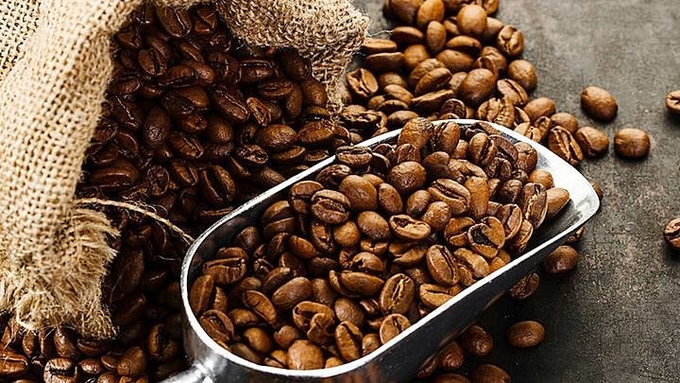
Latest coffee prices globally and domestically on 09/17/2024
Globally, coffee prices have slightly decreased on both the London and New York exchanges.
On the London exchange, Robusta coffee for November 2024 delivery dropped by $ 21 (0.4%), reaching $ 5,246/ton. The contract for January 2025 also fell by $ 21 USD (0.42%), settling at $ 4,977/ton.
On the New York exchange, Arabica coffee for December 2024 delivery decreased by 0.9 cents (0.35%), reaching 258.55 cents/lb. The contract for March 2025 fell by 0.5 cents (0.19%), at 256.10 cents/lb.
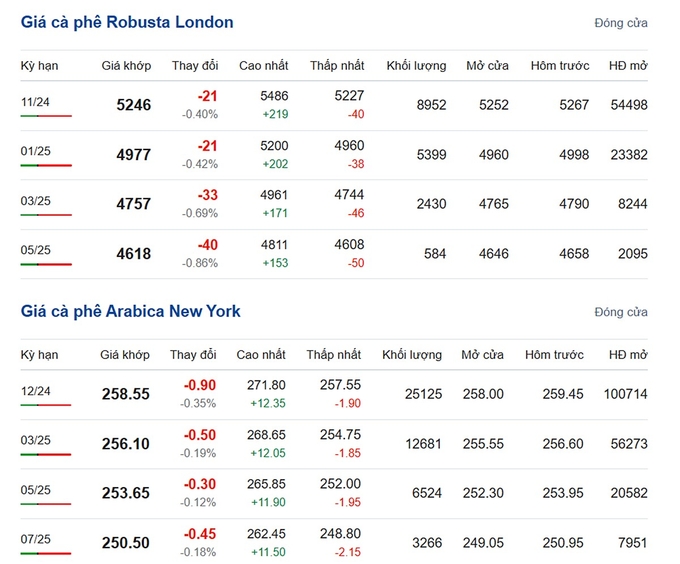
Latest Arabica and Robusta prices on 09/17/2024
Today, global coffee prices exhibited mixed movements, initially rising sharply at the beginning of the trading session but then gradually decreasing, closing with a slight decline.
Experts attribute this decrease to investors selling off their positions towards the end of the session. This trend was anticipated due to the high level of short positions on both exchanges and the approaching closeout date for trading positions.
Thus, coffee prices globally on 09/17/2024, have experienced a slight decline compared to yesterday.
In the domestic market, coffee prices have decreased by VND 500 compared to yesterday.
Specifically, in Lam Dong Province, the districts of Di Linh, Bao Loc, and Lam Ha are trading at VND 123,000/kg.
In Dak Lak Province, the district of Cu M'gar is purchasing coffee at VND 123,500/kg, while the districts of Ea H'leo and Buon Ho are trading at VND 123,400/kg.
In Dak Nong Province, traders in Gia Nghia and Dak R'lap are dealing at VND 123,500 and VND 123,400/kg, respectively.
In Gia Lai Province, the district of Chu Prong is trading at VND 123,400/kg, while Pleiku and La Grai are both maintaining a price of VND 123,300/kg.
In Kon Tum Province, the purchasing price today is VND 123,400/kg.
Domestic coffee prices on 09/17/2024, have decreased slightly, pushing the price of the commodity below VND 124,000/kg.
According to data released by the General Department of Customs, Vietnam's coffee exports in August reached 76,214 tons, valued at $ 402.2 million, a 9.9% decrease in volume but a significant 55.8% increase in value compared to the same period in 2023.
In the first eight months of the year, Vietnam exported nearly 1.1 million tons of coffee, earning $ 4 billion. Despite a 12.1% drop in export volume, the export value still rose by 35.6% compared to the same period.
With these results, the coffee export turnover after eight months is nearing the record level of $ 4.2 billion achieved for the entire last year.
This result is due to the continuous rise in the price of this commodity in recent times. In August alone, the average export price of Vietnamese coffee set a new record at $ 5,278/ton, an increase of 6.6% from the previous month and up 73% ($ 2,226/ton) compared to the same period last year.
For the first eight months of the year, the average export price of coffee has increased by 54.3%, reaching an average of $ 3,800/ton.
Thus, on 09/17/2024, domestic coffee prices are trading around VND 123,000 - 123,500/kg.
$ 1 = VND 24.400 - Source: Vietcombank.
Translated by Hoang Duy

(VAN) Japan will release another 200,000 metric tons of rice from its emergency stockpile to tackle a doubling of prices since last year, Agriculture Minister Shinjiro Koizumi said on Tuesday.

(VAN) Coffee prices on June 13 declined sharply for Arabica. Domestic coffee market in Vietnam dropped by VND 2,000, trading at VND 111,500 – 112,300/kg.

(VAN) Coffee prices on June 12, 2025, continued to fall. Domestically, coffee prices decreased by another VND 2,000, trading at VND 111,500 – 112,300/kg.

(VAN) Coffee prices on June 11, 2025, fell sharply across global markets. Domestic coffee market dropped by VND 700, to the range of VND 113,500 – 114,300/kg.
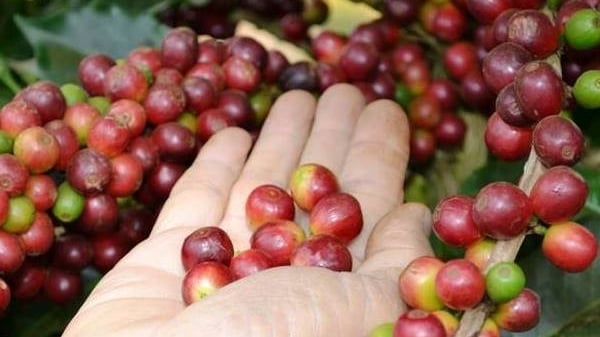
(VAN) Coffee prices on June 10 2025, rose sharply worldwide for Robusta. Domestic coffee market increased by VND 800, reaching VND 114,200 – 114,800/kg.
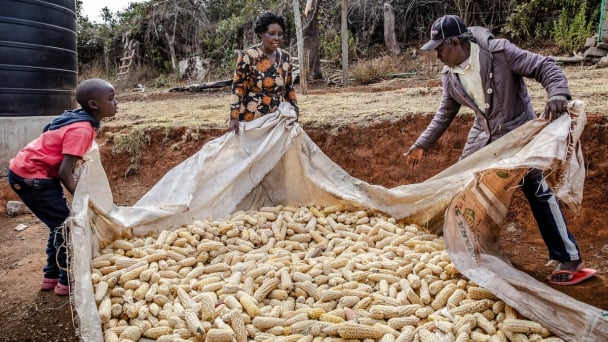
(VAN) New FAO forecasts point to record global cereal output with a partial rebound in stocks and trade.
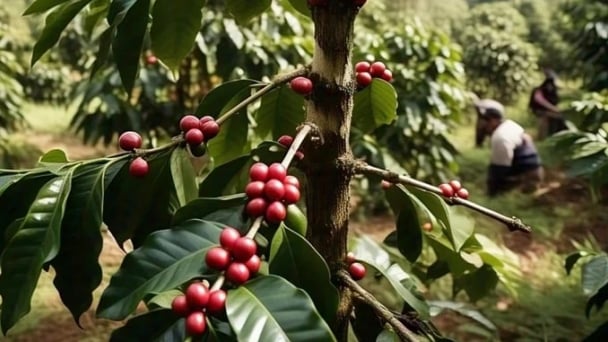
(VAN) Coffee prices on June 9, 2025, in domestic and global markets remain unchanged. Domestic coffee market is currently trading at VND 113,500 – 114,000/kg.